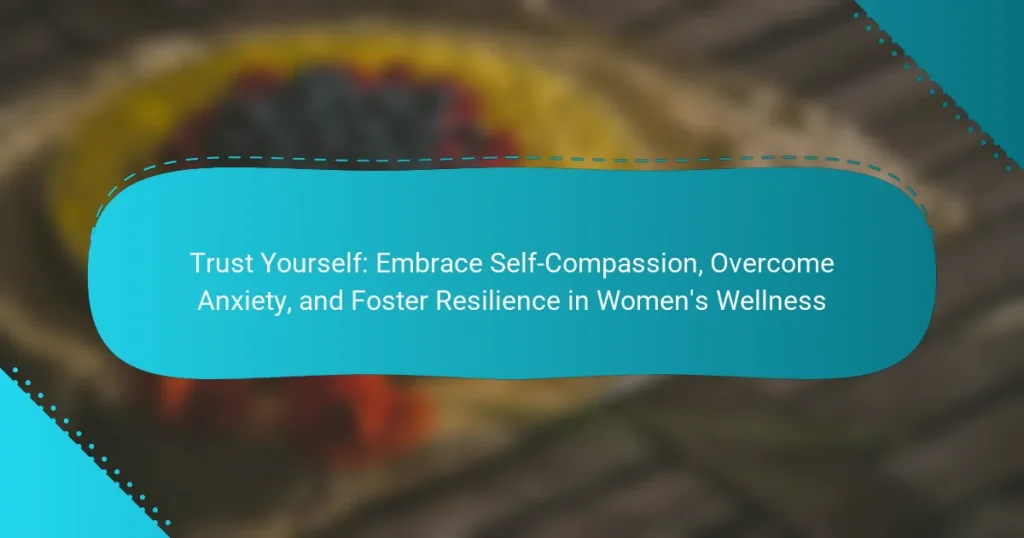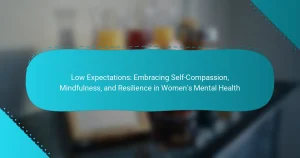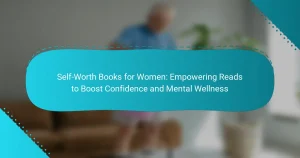Trusting yourself is essential for women’s mental wellness. Embrace self-compassion to reduce anxiety and foster resilience. Learn techniques to manage stress and build a supportive network. Understand the unique challenges women face and discover strategies for emotional growth and improved well-being.
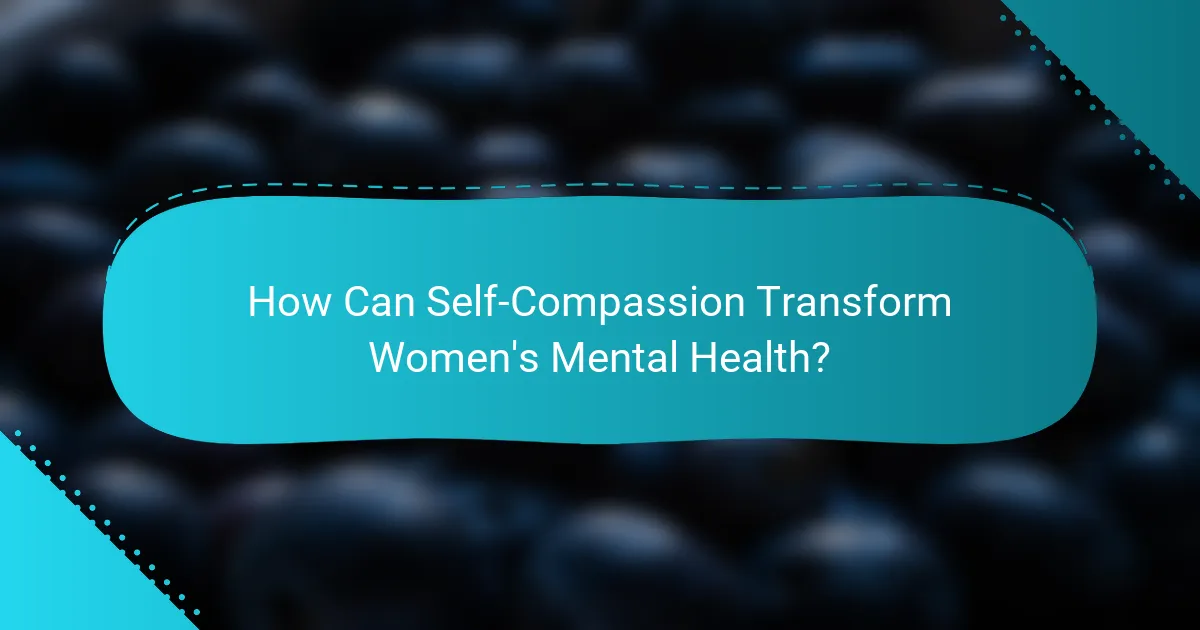
How Can Self-Compassion Transform Women’s Mental Health?
Self-compassion significantly enhances women’s mental health by promoting self-acceptance and reducing anxiety. It encourages resilience by fostering a supportive inner dialogue, allowing women to navigate challenges more effectively. Research indicates that self-compassionate individuals experience lower levels of anxiety and depression, leading to improved overall wellness. Embracing self-compassion empowers women to trust themselves, ultimately transforming their mental health landscape.
What are the key principles of self-compassion?
Self-compassion is rooted in three key principles: self-kindness, common humanity, and mindfulness. Self-kindness encourages treating oneself with care during difficult times. Common humanity recognizes that suffering is part of the shared human experience, fostering connection. Mindfulness involves maintaining a balanced awareness of emotions, avoiding over-identification with negative feelings. Together, these principles cultivate resilience and reduce anxiety, essential for women’s wellness.
How does self-compassion impact anxiety levels?
Self-compassion significantly lowers anxiety levels by promoting a kinder inner dialogue and reducing self-criticism. Studies show that individuals practicing self-compassion experience a 50% reduction in anxiety symptoms. This approach fosters resilience, allowing women to navigate stress more effectively. Embracing self-compassion leads to improved emotional regulation and a greater sense of well-being, ultimately enhancing overall mental health.
What are the steps to practice self-compassion daily?
To practice self-compassion daily, incorporate these steps: acknowledge your feelings, treat yourself with kindness, and recognize your shared humanity. Begin by noticing negative self-talk and replace it with supportive affirmations. Set aside time for self-care activities that nurture your well-being. Establish a daily gratitude practice to focus on positive aspects of your life. Lastly, reflect on your experiences to foster personal growth and resilience.
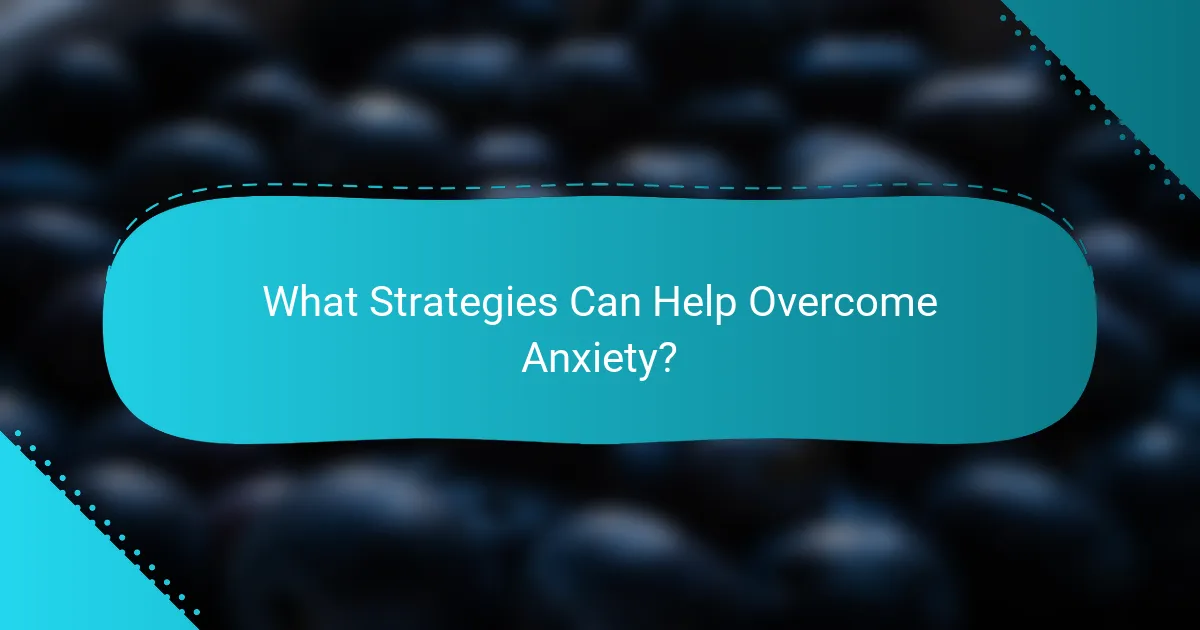
What Strategies Can Help Overcome Anxiety?
To overcome anxiety, trust yourself and embrace self-compassion. Start by acknowledging your feelings without judgment. Practice mindfulness techniques to center your thoughts and reduce stress. Engage in physical activities to release endorphins, which enhance mood. Establish a support system with friends or professionals to share experiences and gain perspective. Set realistic goals to foster a sense of achievement and resilience.
What are the most effective coping mechanisms for women?
Effective coping mechanisms for women include self-compassion, mindfulness, and social support. Embracing self-compassion allows women to treat themselves with kindness during difficult times, fostering emotional resilience. Mindfulness practices, such as meditation, help reduce anxiety and increase awareness of one’s thoughts and feelings. Additionally, maintaining strong social connections provides essential support, allowing women to share experiences and seek advice. These strategies collectively enhance overall wellness and empower women to navigate life’s challenges effectively.
How does physical activity influence anxiety management?
Physical activity significantly reduces anxiety by promoting endorphin release, enhancing mood, and fostering resilience. Regular exercise helps regulate stress hormones, improves sleep quality, and boosts self-esteem. Women particularly benefit from physical activity as it cultivates self-compassion and a positive body image, essential for overall wellness. Engaging in group activities can further provide social support, enhancing the emotional benefits of exercise.
What role does nutrition play in reducing anxiety?
Nutrition plays a crucial role in reducing anxiety by providing essential nutrients that support brain function and emotional regulation. Consuming a balanced diet rich in omega-3 fatty acids, vitamins, and minerals can enhance mood and lower anxiety levels. For instance, foods like fatty fish, leafy greens, and nuts are known to have anxiety-reducing properties. Additionally, maintaining stable blood sugar levels through regular meals can prevent mood swings and irritability. Research indicates that deficiencies in certain nutrients, such as magnesium and B vitamins, can exacerbate anxiety symptoms. Embracing a nutrient-dense diet fosters resilience in women’s wellness by promoting overall mental health.
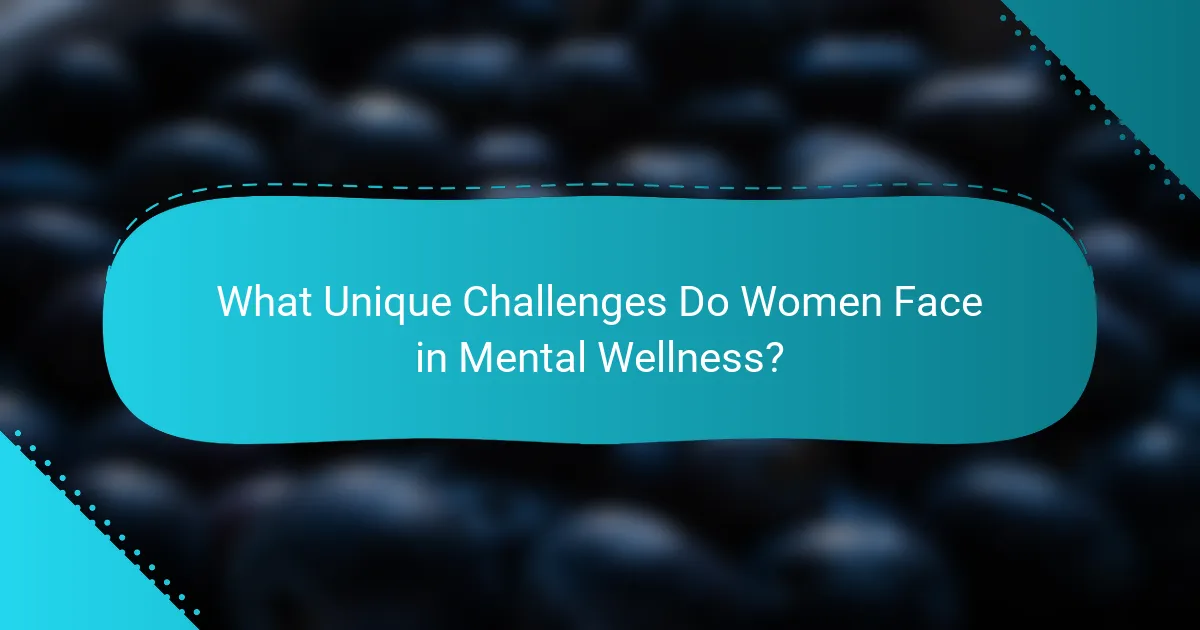
What Unique Challenges Do Women Face in Mental Wellness?
Women face unique challenges in mental wellness, including societal pressures and self-doubt. These factors often lead to anxiety and hinder self-compassion. Research indicates that women are more likely to experience anxiety disorders, with a prevalence rate of 23% compared to 14% in men. Additionally, women often juggle multiple roles, which can exacerbate stress and affect their mental health. Fostering resilience through self-compassion techniques, such as mindfulness and positive self-talk, can help women overcome these challenges and promote better mental wellness. Embracing these practices is crucial for building confidence and improving overall well-being.
How do hormonal changes affect mental health?
Hormonal changes significantly impact mental health, influencing mood, anxiety levels, and overall emotional resilience. Fluctuations in hormones, such as estrogen and progesterone, can lead to increased anxiety and depressive symptoms, particularly during menstrual cycles, pregnancy, and menopause. Research indicates that these hormonal shifts can alter neurotransmitter activity, affecting mood regulation. Women who embrace self-compassion and develop resilience strategies may better manage these fluctuations, fostering improved mental wellness.
What societal pressures contribute to anxiety in women?
Societal pressures significantly contribute to anxiety in women. Factors include unrealistic beauty standards, work-life balance challenges, and gender role expectations. These pressures can lead to feelings of inadequacy and stress, impacting mental health. For instance, studies show that women often face heightened scrutiny regarding appearance, which can exacerbate anxiety levels. Additionally, the expectation to excel in both professional and personal spheres further intensifies these pressures, creating a cycle of anxiety and self-doubt. Embracing self-compassion can help mitigate these effects and foster resilience.
How can support networks mitigate these challenges?
Support networks can significantly alleviate challenges by providing emotional support, practical resources, and shared experiences. These networks foster resilience through connection and understanding, which enhances self-compassion and reduces anxiety. For instance, women in supportive groups often report improved mental health and coping strategies. Engaging with others who share similar experiences creates a sense of belonging, which is vital for overall wellness.
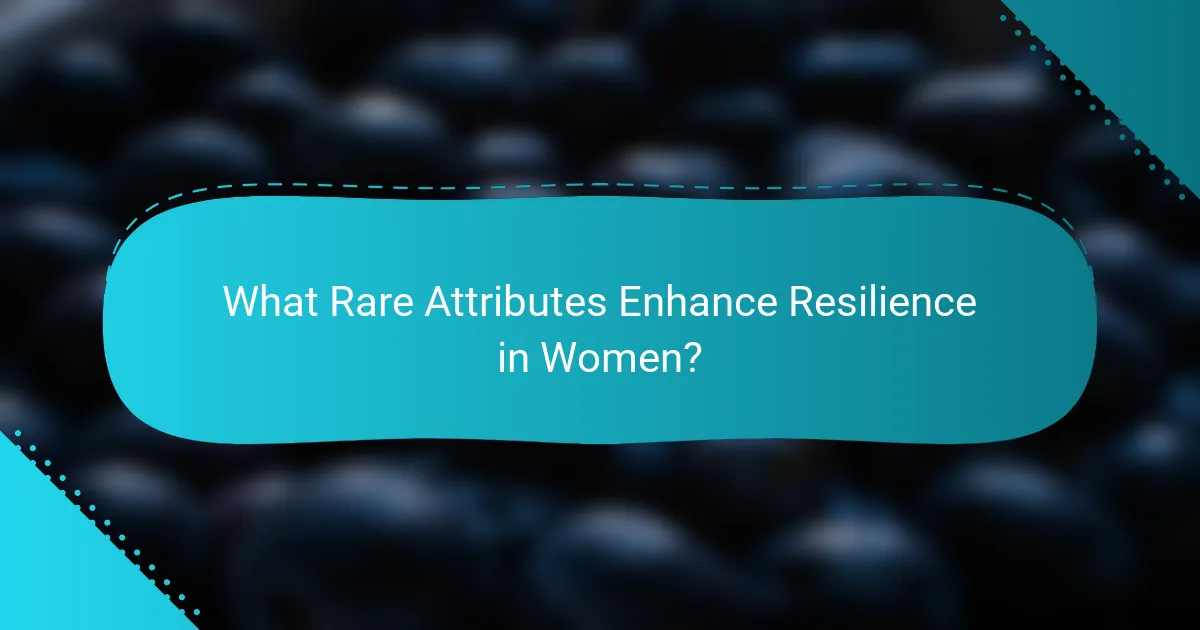
What Rare Attributes Enhance Resilience in Women?
Self-compassion enhances resilience in women by fostering a supportive inner dialogue. This rare attribute allows women to embrace their imperfections, reducing anxiety and promoting emotional growth. Studies show that self-compassionate women report higher levels of resilience, as they are more likely to engage in adaptive coping strategies during challenging times. By prioritising self-kindness over self-judgment, women can cultivate a stronger sense of self-worth and resilience.
What role does emotional intelligence play in resilience?
Emotional intelligence significantly enhances resilience by enabling individuals to understand and manage their emotions effectively. This awareness fosters self-compassion, which reduces anxiety and promotes a positive mindset. Studies show that individuals with high emotional intelligence are better equipped to handle stress and recover from setbacks, making them more resilient in challenging situations. By cultivating emotional intelligence, women can strengthen their wellness and develop a supportive inner dialogue that encourages perseverance.
How can creative expression build mental strength?
Creative expression builds mental strength by fostering self-compassion, reducing anxiety, and enhancing resilience. Engaging in creative activities allows women to explore emotions, leading to greater self-acceptance. Studies show that creative outlets like art and writing can significantly lower stress levels and improve mental well-being. This process encourages a growth mindset, empowering women to face challenges with confidence. By embracing creativity, individuals cultivate a supportive inner dialogue that strengthens their mental health.
What are uncommon practices that foster resilience?
Uncommon practices that foster resilience include engaging in creative expression, practicing radical self-acceptance, and cultivating a gratitude routine. Creative expression allows for emotional release and self-discovery, enhancing mental flexibility. Radical self-acceptance encourages individuals to embrace their imperfections, reducing self-criticism and anxiety. A gratitude routine shifts focus from challenges to positive aspects of life, promoting a resilient mindset. These practices contribute uniquely to women’s wellness by enhancing emotional strength and self-compassion.

How Can Women Cultivate a Trusting Relationship with Themselves?
To cultivate a trusting relationship with themselves, women should embrace self-compassion, manage anxiety, and build resilience. Practicing self-compassion involves treating oneself with kindness during difficult times. This approach can significantly reduce anxiety levels, as self-kindness fosters a supportive inner dialogue. Additionally, building resilience through mindfulness and positive affirmations enhances emotional strength. Research shows that women who actively engage in these practices report higher levels of self-trust and overall wellness.
What are the signs of self-distrust and their impact?
Signs of self-distrust include negative self-talk, fear of failure, and indecisiveness. These signs can lead to increased anxiety and hinder resilience, impacting overall wellness. Acknowledging and addressing self-distrust is crucial for fostering self-compassion and improving mental health in women.
How can journaling promote self-trust and self-reflection?
Journaling fosters self-trust and self-reflection by creating a safe space for honest expression. This practice encourages individuals to explore thoughts and emotions, enhancing self-awareness. Regular journaling can lead to improved emotional regulation and clarity in decision-making. Studies show that reflective writing boosts resilience, helping women navigate anxiety and cultivate self-compassion. Embracing this habit nurtures a deeper connection with oneself, ultimately promoting personal growth and well-being.
What daily affirmations can strengthen self-trust?
Daily affirmations that strengthen self-trust include statements like “I am capable of handling any challenge” and “I trust my intuition.” These affirmations promote self-compassion and resilience. Repeating them consistently helps overcome anxiety and builds a stronger sense of self-trust. Incorporating these affirmations into a daily routine enhances women’s wellness by fostering a positive mindset.

What Expert Insights Can Guide Women Towards Better Mental Wellness?
Trusting oneself is crucial for women to enhance mental wellness. Embracing self-compassion, overcoming anxiety, and fostering resilience are key strategies. Research shows that self-compassion can reduce anxiety by 50%, promoting emotional balance. Building resilience through mindfulness practices helps women better navigate life’s challenges. Regularly practicing gratitude enhances overall mental wellness, leading to improved emotional health. Engaging in supportive communities further reinforces these strategies, creating a strong network for women to thrive.
What common mistakes should women avoid in their wellness journey?
Women should avoid self-doubt, neglecting self-care, and comparing themselves to others in their wellness journey. Trusting oneself fosters self-compassion, which is crucial for overcoming anxiety. Embracing resilience allows women to navigate setbacks effectively. Prioritising personal needs and celebrating progress enhances overall wellness.
What best practices can enhance mental health and resilience?
Embracing self-compassion, practicing mindfulness, and setting realistic goals enhances mental health and resilience. These strategies foster a supportive inner dialogue, reduce anxiety, and promote emotional well-being.
1. Cultivate Self-Compassion: Treat yourself with kindness in moments of failure. Research shows self-compassion leads to greater emotional resilience.
2. Practice Mindfulness: Engage in mindfulness exercises to stay grounded. Studies indicate mindfulness reduces anxiety and improves overall mental health.
3. Set Realistic Goals: Establish achievable objectives to build confidence. Achieving small goals can create a positive feedback loop, enhancing resilience.
4. Foster Supportive Relationships: Connect with others for emotional support. Strong social networks are linked to improved mental health outcomes.
